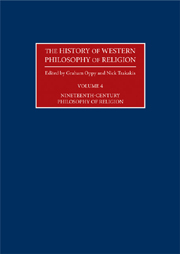Book contents
- Frontmatter
- Contents
- Editorial Introduction
- Contributors
- 1 Nineteenth-Century Philosophy of Religion: An Introduction
- 2 Johann Gottlieb Fichte
- 3 Friedrich Schleiermacher
- 4 G. W. F. Hegel
- 5 Friedrich Schelling
- 6 Arthur Schopenhauer
- 7 Auguste Comte
- 8 John Henry Newman
- 9 Ralph Waldo Emerson
- 10 Ludwig Feuerbach
- 11 John Stuart Mill
- 12 Charles Darwin
- 13 Søren Kierkegaard
- 14 Karl Marx and Friedrich Engels
- 15 Wilhelm Dilthey
- 16 Edward Caird
- 17 Charles S. Peirce
- 18 Friedrich Nietzsche
- 19 Josiah Royce
- 20 Sigmund Freud
- 21 Émile Durkheim
- Chronology
- Bibliography
- Index
19 - Josiah Royce
- Frontmatter
- Contents
- Editorial Introduction
- Contributors
- 1 Nineteenth-Century Philosophy of Religion: An Introduction
- 2 Johann Gottlieb Fichte
- 3 Friedrich Schleiermacher
- 4 G. W. F. Hegel
- 5 Friedrich Schelling
- 6 Arthur Schopenhauer
- 7 Auguste Comte
- 8 John Henry Newman
- 9 Ralph Waldo Emerson
- 10 Ludwig Feuerbach
- 11 John Stuart Mill
- 12 Charles Darwin
- 13 Søren Kierkegaard
- 14 Karl Marx and Friedrich Engels
- 15 Wilhelm Dilthey
- 16 Edward Caird
- 17 Charles S. Peirce
- 18 Friedrich Nietzsche
- 19 Josiah Royce
- 20 Sigmund Freud
- 21 Émile Durkheim
- Chronology
- Bibliography
- Index
Summary
Josiah Royce (1855–1916) was a central figure in late-nineteenth- and early-twentieth-century American philosophy. He is primarily known for his advocacy of a form of idealist metaphysics. His metaphysical interests led him to a fundamental reconsideration of topics in the philosophy of religion, ethics, the philosophy of science and logic. Royce spent his entire career as a professor at Harvard University. This position brought him into regular contact not only with William James (see Vol. 5, Ch. 2), Charles S. Peirce and other figures who shaped the dynamic ‘Golden Age’ of pragmatism, but also with the vibrant personalist movement led by Borden Parker Bowne. Both of these movements had significant influence on Royce's philosophy, particularly in the areas of ethics and religion.
Royce's work in the philosophy of religion is characterized by several important factors besides his post-Hegelian idealism and his propensity for systematic philosophy. First, Royce's childhood education in the remote mining town of Grass Valley, California – where he was born in 1855 – was heavily flavoured by his family's evangelical Christian beliefs and practices. Protestant theism and religious life were basic facts of experience for Royce, as is evidenced by the frequent and comfortable references to Scripture that appear in his writings. Secondly, Royce's undergraduate education at the University of California was in classics rather than in philosophy or divinity. In keeping with this training, he was always cognizant of the literary and historical significance of the problems of philosophy.
- Type
- Chapter
- Information
- The History of Western Philosophy of Religion , pp. 249 - 262Publisher: Acumen PublishingPrint publication year: 2009

